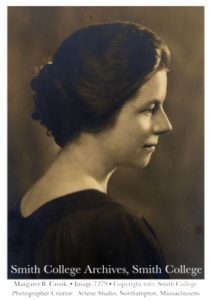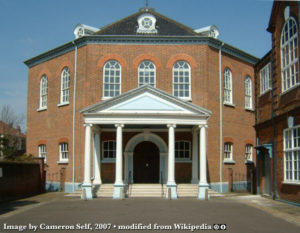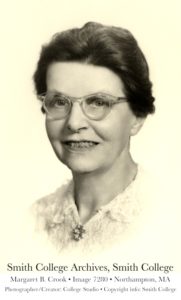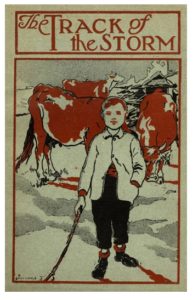Margaret Brackenbury Crook (May 5, 1886–May 24, 1972) was a British Unitarian minister, women’s suffragist, peace activist, and religious studies professor. She was the first English woman to be fully trained for the Unitarian ministry at Manchester College in Oxford, as well as one of the first English women to be granted sole authority over a large church. She is best remembered for her path-breaking writings on feminist biblical analysis and theology, which she articulated in her book, Women and Religion (1964).

Crook, born in Dymock, Gloucestershire, England, was the eldest child of Ellen Brackenbury Crook and the Reverend L. G. Harris Crook. She had two younger brothers, Wilfrid Harris and Waldo Neville. Crook dated her English and Unitarian pedigree to the time of King William I, when two brothers by the name of “Croche,” meaning “cross,” migrated in the fifteenth century to Bolton, Lancashire. They became weavers and eventually rose to the merchant middle class, now living by the name of “Crook.”
Margaret Crook’s family produced several Unitarian ministers. Margaret’s great-grandfather, who was the son of a non-conformist minister, was the accomplished Unitarian minister, George Harris. Educated at Glasgow University, Harris was known for his ministries in northern England and Scotland, as well as his founding work in two Unitarian publications, The Christian Pioneer (1826–1845) and The Christian Pilot (1847–1851). His grandson, Leopold Crook, was Margaret Crook’s father.
Crook’s father attended college and became a Unitarian minister, having first lived for a time as a “gentleman farmer.” After serving the church at Ilkeston, near Derby, for two years, in 1895 he and his wife moved on to the Unitarian church at Snow Hill in Wolverhampton. There, they opened a new school. Just weeks after the school opened, however, he died of accidental injuries at age 32.
Margaret was eight years old at the time of her father’s death. From the early loss of her father, she developed a lasting sense of family attachment, as well as a determination to carry on her father’s ministry. ”I had always wanted to go into the ministry,” she later wrote. “It seemed the most natural thing in the world for me, long before I realized that it meant helping to open up a profession new to women.”
Crook began her studies in 1910 with the Society of Oxford Home Students (later St. Anne’s Society or College) at Oxford University. However, because Oxford did not bestow degrees to women until 1920, she received her B.A. with first-class honors not from Oxford, but from the University of London in 1913. The following year the Oxon examiners in anthropology marked her diploma as worthy of distinction.
Crook’s great-grandfather, George Harris, had not been accepted at Oxford University because he was a Unitarian. He could not pass the religion test since he would not consent to Anglican belief. In 1914, when Crook sought admission for ministerial studies at Manchester College (which changed its name to Harris Manchester College in 1996) she met with difficulty. Despite her religious affiliation, her admission to Manchester College was questioned due to her gender. The trustees did not doubt her academic or ministerial potential, but rather her “normalcy” as measured by male standards. Crook later wrote that someone encouraged her to emphasize her athletic abilities. After informing the trustees that she was “captain of the hockey eleven and the basketball team,” Crook was admitted.
During her three-year course of theological study at Manchester, Crook became an activist. She joined the Young Liberal Women in Wolverhampton, a women’s suffrage group, and the Women’s Social and Political Union (WSPU). The WSPU was a militant suffrage group led by the women of the Pankhurst family. With the outbreak of World War I, Margaret volunteered with Quakers to attend and monitor court hearings for Conscientious Objectors. In 1916-1917, she also traveled to Northern France to work for the Friends War Relief Committee. There, she engaged in high-risk relief work with refugee women and children.
In 1917, Crook received a certificate from Manchester College. Not only was she the first English woman to be fully trained for the Unitarian ministry at Manchester College, but she graduated first in her class. Crook encountered difficulty in finding a pulpit, but she persisted in her search until she received four offers. In 1918, she accepted a position at Norwich’s famous Octagon Chapel, making her the first English woman to have trained for ministry and be given sole authority over a large church. A German woman, Gertrude von Petzold, trained for the ministry in England, attended Manchester College, and was inducted into the ministry at the Narborough road Free Christian (Unitarian) church in Leicester in 1904. Caroline Soule, ordained by Universalists in Glasgow, Scotland in 1880 was the first woman to be ordained in the United Kingdom.
Crook’s congregation in Norwich thrived under her leadership. According to Crook, she “reorganized the Sunday school of two hundred fifty scholars and teachers, set up a [weekly] Play Center for children suffering from neglect during the war [and] helped cope with the influenza epidemic which caused many deaths.” Remarkably, she was also “urged to stand for Parliament as one of two Labo[u]r candidates.” This she declined, saying that she preferred “to work in the field of religion.”
Crook’s early ministerial success, which clearly extended beyond the pulpit, was soon interrupted. Her brother Wilfrid, who had been studying economics at Harvard, was preparing to marry an American woman and establish his academic career in New York City. Crook’s aging mother and her brother Waldo, who appears to have been suffering from mental illness, decided to join Wilfrid in America. This posed a quandary for Crook. As a thirty-three year old single woman, she enjoyed the public life of a “more than equal” woman Unitarian minister. But with no husband or other vital personal relationship, she saw her obligation to her birth family as primary. Margaret faced a wrenching choice: whether to join her family in America or stay with her hard-won ministry now flourishing in England. She chose her family, resigning from the Octagon Chapel and sailing to America in June 1920.
After arriving in the United States, Crook made prominent contacts in Unitarian circles, but she experienced little welcome from the American Unitarian Association, whose president since 1899 was Samuel Atkins Eliot. Crook assumed that Eliot shut her out of ministry because she was English, but historical evidence clearly indicates that he sidelined Crook because of her sex. During Eliot’s tenure, male English Unitarian ministers who had migrated to the United States were fellowshipped without difficulty, while the number of women ordained sharply declined. In fact, only one woman, the Rowena Morse of Geneva, Illinois, was ordained in the sixteen years following Eliot’s assumption of the AUA presidency. It is worth noting that Eliot also strongly opposed woman suffrage. Nevertheless, throughout her life, Crook never hinted that she might have faced sexual discrimination. The reasons for her silence are unclear.
Without a pulpit, Crook felt adrift and even questioned her decision to move to America. Meanwhile, she turned to her peace activist network and found a position as the Executive Secretary of the American branch of the Women’s International League for Peace and Freedom (WILPF) based in New York. Chicago social worker, Jane Addams and Wellesley professor Emily Greene Balch were founding members and both would receive the Nobel Peace Prize for their work. Olympia Brown was also an original member. Leaning toward pacifism and socialism, the League was considered radical at a time when Americans were increasingly isolationist, xenophobic, and patriotic. During this time, Crook worked with women’s colleges, speaking to students to recruit new interest in the WILPF.
Upon hearing Crook lecture in Northampton, Massachusetts, Smith College President William Allan Neilson invited her to join the Department of Religion and Biblical Literature, to begin in the fall of 1921. Crook welcomed this opportunity to pursue an academic career. She moved to Northampton that summer with her mother and brother Waldo. There, Crook cared for them both and supported them financially.
 Crook recreated herself as a college professor of religion. She learned Hebrew and specialized in Hebrew Bible scholarship at a time when women were at their peak as members of the venerable scholarly Society of Biblical Literature and Exegesis (SBL). Significantly, the SBL exemplified Crook’s own progressive views, promoting modern thinking toward critical historical analysis of the Bible, rather than accepting a traditional view of the Bible as the infallible Word of God. In 1934 she was an honorary lecturer at the Jerusalem School of Oriental Research. Crook also became a member of the National Association of Biblical Instructors and represented Smith College on the Corporation of the American Schools of Oriental Research; serving as honorary secretary in 1942 and president in 1943.
Crook recreated herself as a college professor of religion. She learned Hebrew and specialized in Hebrew Bible scholarship at a time when women were at their peak as members of the venerable scholarly Society of Biblical Literature and Exegesis (SBL). Significantly, the SBL exemplified Crook’s own progressive views, promoting modern thinking toward critical historical analysis of the Bible, rather than accepting a traditional view of the Bible as the infallible Word of God. In 1934 she was an honorary lecturer at the Jerusalem School of Oriental Research. Crook also became a member of the National Association of Biblical Instructors and represented Smith College on the Corporation of the American Schools of Oriental Research; serving as honorary secretary in 1942 and president in 1943.
Besides her full teaching load, Crook led her colleagues in developing an interdepartmental course called “The Bible and Its Literary Associations.” Soon, President Nielson asked her to edit a book by the same name, and she wrote more than half the essays in this composite work. Crook would eventually publish four books and a dozen articles, almost all related to her area of research, the Hebrew Bible. It has been suggested somewhat critically that women SBL members did not produce a unified, feminist reading of the Bible. The subjects of Crook’s writing, however, often were women and in her final book, Women and Religion (1964), she consciously attempted a unified “feminist” reading of the Bible.
In 1923-24, Crook undertook a speaking tour throughout the eastern half of the United States, speaking on such topics as “Ministry is Opening to Women in England,” “Can We Keep Pace Morally With the Development of Society,” “The Challenge of Fundamentalism,” and “Women Ministers Finally Break Through Prejudice.” This led to the printing of a brochure advertising her lectures and sermons. Though not pastoring a congregation, through this work Crook modeled ministry in a different and very public forum, a vocation that might be called community ministry today.
Crook’s ministry extended as well to the Northampton Unitarian Church, where she held membership from 1921 until her death. There she worked with the children, served as president of the Women’s Alliance (at age 79), and was a long-term member of the Northampton Ministers Association. In the 1960s, she was asked to be on call one summer when the Amherst Unitarian minister went to Europe. Based on her ministerial work, in 1955 Crook asked the AUA to clarify her status, but they told her that they would not do so for anyone not in an active post. Despite this denial of official ministerial recognition, Crook wrote to her Beacon Press editor, “I have always considered my life-work in religion a ministry.”
Crook was determined to leave a legacy for the encouragement of women. In Women and Religion, she laid out the declining state of ministry for women. She cited the listings of women ministers from the Unitarian yearbook: in 1900 there were 29, and in 1948 there were 12, with only two women in active churches. At the time of the Unitarian-Universalist merger in 1961, the combined number of women ministers was 24, with only eight being active. In Women and Religion, Crook told the story of women in all western religion: Judaism, Christianity, and Islam. She also offered an interpretation of Hebrew and Christian scriptures from a woman’s perspective and discussed the history of women in western religious history and particularly women in ministry. More fundamentally, she offered a gendered analysis of the theological cost of women remaining at a low status in religious institutions and envisioned a new partnership, even a new “feminist” theology. Interestingly, prior to writing Women and Religion, Crook had studied Betty Friedan’s The Feminist Mystique and later commented that it had paved the way for her own book, which was a “more specialized, yet wider, more historical and theological effort.”
Crook called her work a “pioneer endeavor,” showing the potential of welcoming women’s perspective in religion, of opening a door, as she wrote, “to bring women a sense of their potentialities and direction in creating a balanced partnership in religion.” However, the mixed reviews of Women and Religion mostly offered praise for her sophisticated biblical commentary and criticism of western religious history. It was not until the 1980s, when feminist religious studies gained traction as an academic discipline, that religious scholars highlighted Women and Religion for its discussion of male domination in the Judeo-Christian tradition and its call for women to assume an active role in reshaping their faith. Still, the fact that Crook’s work was noticed nearly two decades later suggests how ground-breaking her ideas had been when she first put them into print.
Crook retired from Smith College in 1954, but she continued her academic work. As an emeritus professor still pursuing scholarship, she was named Sophia Smith Fellow of Smith College eight years in a row following her retirement. Notably, in the 1950s she also served as a visiting lecturer at Manchester College for two years—a remarkable achievement considering her difficulties in gaining admission to Manchester’s religious studies program 40 years earlier. Thereafter, she continued to live in Northampton with her brother Waldo, who cared for her in her final years when her health began to fail. Crook died on May 24, 1972, following a brief illness. At the time of her death, she had finished a book-length manuscript on the life and thought of the Apostle Paul.
 Crook’s papers are housed at the Smith College Archives in Northampton, Massachusetts. They include biographical materials, correspondence, photographs, publications, and reviews covering Crook’s career as a faculty member at Smith College. Additional papers are found in the Archives of the John Day (Publishing) Company held by the Princeton University Library in Princeton, New Jersey and the Beacon Press Archives at the Andover Harvard Library in Cambridge, Massachusetts. Books by Crook include The Track of the Storm: Tales of the Marne, the Meuse, and the Aube (1917), a collection of stories gathered during her time in Europe during the First World War. The Abington Press printed her chart, An Outline of the Literary History of the Bible (1932) while the related book, which Crook edited, The Bible and Its Literary Associations following in 1937. Her major works are, The Cruel God: Job’s Search for the Meaning of Suffering (1956), Women and Religion (1964), and an unpublished book-length manuscript on the life and thought of the Apostle Paul (Paul and Ourselves, 1964). Crook also published numerous articles, including “Women and Religious Teaching: Women’s Colleges in the United States” (1926), “The American Woman Graduate” (1928), “Slings and Arrows” in The Commonweal (1930), and “Religion—A World Without Women” (1964). Margaret Crook, along with her brother Waldo, composed the choral works “Hail Pan-America” (1940) and “The Torch of Freedom,” (1941).
Crook’s papers are housed at the Smith College Archives in Northampton, Massachusetts. They include biographical materials, correspondence, photographs, publications, and reviews covering Crook’s career as a faculty member at Smith College. Additional papers are found in the Archives of the John Day (Publishing) Company held by the Princeton University Library in Princeton, New Jersey and the Beacon Press Archives at the Andover Harvard Library in Cambridge, Massachusetts. Books by Crook include The Track of the Storm: Tales of the Marne, the Meuse, and the Aube (1917), a collection of stories gathered during her time in Europe during the First World War. The Abington Press printed her chart, An Outline of the Literary History of the Bible (1932) while the related book, which Crook edited, The Bible and Its Literary Associations following in 1937. Her major works are, The Cruel God: Job’s Search for the Meaning of Suffering (1956), Women and Religion (1964), and an unpublished book-length manuscript on the life and thought of the Apostle Paul (Paul and Ourselves, 1964). Crook also published numerous articles, including “Women and Religious Teaching: Women’s Colleges in the United States” (1926), “The American Woman Graduate” (1928), “Slings and Arrows” in The Commonweal (1930), and “Religion—A World Without Women” (1964). Margaret Crook, along with her brother Waldo, composed the choral works “Hail Pan-America” (1940) and “The Torch of Freedom,” (1941).
Although no full-length biography of Crook has been written, Claudia Elferdink provides a detailed introduction to Crook’s life and career in her article, “’The Religion in the Last Chapter Will Shock Him!’: An Introduction to The Rev. Margaret Brackenbury Crook (1886–1972),” Journal of Unitarian Universalist History (JUUH) (2011–2012). The JUUH article was excerpted from Elferdink’s Harvard Divinity School thesis, “The Religion in the Last Chapter will Shock Him,” (1998). The JUUH article is also available in Hungarian („Amit az utolsó fejezet mond a vallásról, megdöbbentő lesz!” Margaret Brackenbury Crook tiszteletes élete és teológiai tanításai) at the Central and Eastern European Online Library (ceeol.com). Crook also described her own theological education and early ministerial career in the noteworthy newspaper article, “Women Ministers Finally Break Through Prejudice, Says the Rev. Margaret Crook, Who Lectures in Peoria This Evening,” The Peoria (Illinois) Journal (March 24, 1924). In George D. Chyssides, ed. Unitarian Perspectives on Contemporary Religious Thought (1999), Ann Peart provides an historical overview of Unitarian women and the church, including a discussion of Crook’s role as a pioneer Unitarian feminist. Crook’s role in promoting women’s reshaping of the Judeo-Christian tradition is also highlighted in Carolyn DeSwarte Gifford’s “American Women and the Bible: The Nature of Women as a Hermeneutical Issue,” in Adele Yarbro Collins, ed. Feminist Perspectives on Biblical Scholarship (1985). A discussion of Crook’s interpretation of the Book of Job, the formation of the Christian canon, and her notes on translation problems of the King James Version can be found in Marion Ann Taylor and Agnes Choi. eds., Handbook of Women Biblical Interpreters: A Historical and Biographical Guide (2012). For background on Unitarian women in social and religious reform, see Dorothy May Emerson’s Standing Before Us: Unitarian Universalist Women and Social Reform, 1776-1936 (1999) and Dan McKanan’s Prophetic Encounters: Religion and the American Radical Tradition (2012).
Article by Claudia Elferdink
Posted February 14, 2014